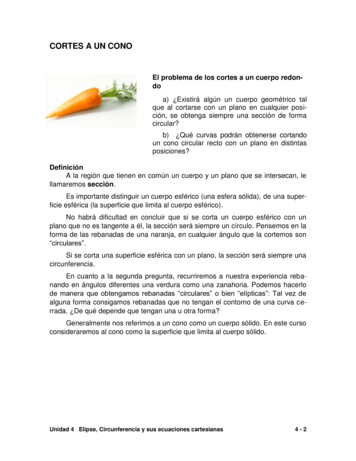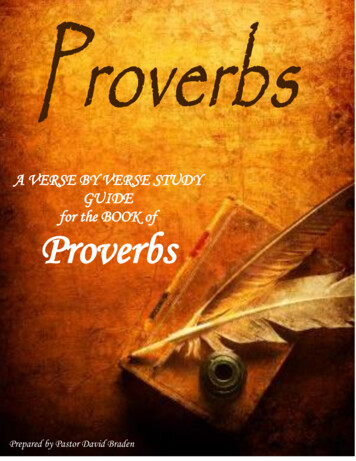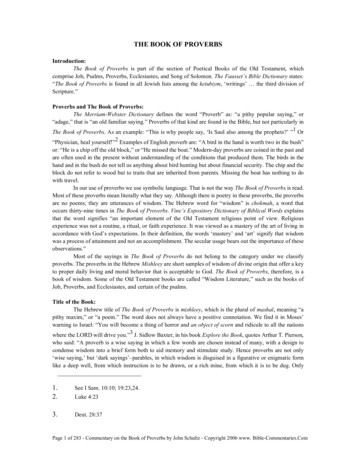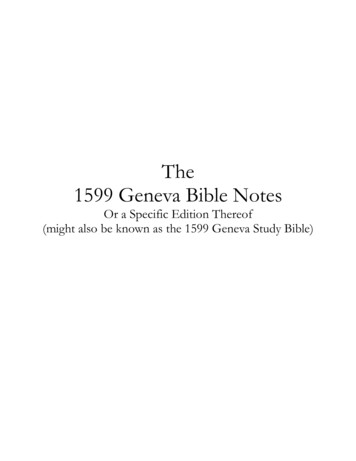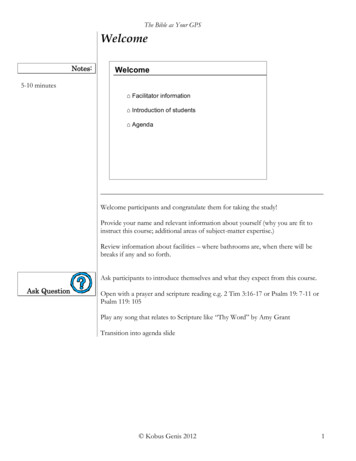
Transcription
Notes onProverbs2 0 2 2 E d i t i o nDr. Thomas L. ConstableTITLEThe title of this book in the Hebrew Bible is "The Proverbs of Solomon, theSon of David, King in Israel" (cf. 1:1). The Greek Septuagint called this book"Proverbs of Solomon." The Latin Vulgate named it "The Book of Proverbs."Translators of English Bibles place Proverbs among the poetic books(Psalms—Song of Solomon), whereas in the Hebrew Bible it is found amongthe "Writings," the third and final major section.There is some debate about whether 1:1 is the title of the whole book orjust the title of the first major section (chs. 1—9). The first view has in itsfavor the fact that the Hebrew Bible took the verse as the title of the book.According to this view the references to Solomon in 1:1 are an indicationthat he was the primary author of the proverbs in the book.1 The secondview is that 1:1 simply introduces the first major section of the book.2 Thesupport for this view is that some succeeding sections begin with a similarcaption (cf. 10:1; 24:23; 25:1; 30:1; 31:1). However, chapters 1—9 donot contain "proverbs" as such, but longer wisdom speeches. In either case,the book got its title from the proverbs it contains. The whole book is abook of proverbs and wise sayings, so the title is appropriate.WRITERProverbs claims to be a compendium of the wise sayings of several differentindividuals. Only Proverbs and Psalms in the Old Testament claim compositeauthorship for themselves. Solomon originated or collected most of the1SeeDerek Kidner, The Proverbs, p. 22.Edward J. Young, An Introduction to the Old Testament, p. 328, who believed that22:17 also contains a heading.2SeeCopyright Ó 2022 by Thomas L. Constable
2Dr. Constable's Notes on Proverbs2022 Editionproverbs (10:1—22:16 and chs. 25—29 definitely, and probably chs. 1—9 as well).1 Unnamed wise men (sages) wrote other parts (22:17—24:34definitely, and possibly chs. 1—9). Hezekiah's men copied some ofSolomon's proverbs and added them to this collection (chs. 25—29). Agurand King Lemuel produced chapters 30 and 31 respectively. We do notknow who the sages were who wrote 22:17—24:34, nor do we know thenames of the men whom King Hezekiah instructed to compile some ofSolomon's sayings. Agur and Lemuel are unknown to us also, thoughLemuel seems to have been a non-Israelite monarch.2Some of the proverbs appear to have been copied from, or at leastinfluenced by, earlier ancient Near Eastern books of wisdom.3" whatever the Spirit of God inspired the ancient writers toinclude became a part of the Word of the Lord. Such inclusionsthen took on a new and greater meaning when they formedpart of Scripture; in a word, they became authoritative andbinding, part of the communication of the divine will."4"The opinion of R. [Rabbi] Jonathan, that Solomon firstcomposed the Canticles, then the Proverbs, and last of allEcclesiastes, inasmuch as the first corresponds with thespring-time of youth, the second with the wisdom of manhood,and the third with the disappointment of old age, is foundedon the supposition of the unity of the book and of itsSolomonic authorship."51SeeAndrew E. Steinmann, "Proverbs 1—9 as a Solomonic Composition," Journal of theEvangelical Theological Society 43:4 (December 2000):659-74.2See my comments on 31:1.3See Jack Finegan, Light from the Ancient Past, pp. 123-25; W. F. Albright, Archaeologyand the Religion of Israel, p. 15; Michael V. Fox, Proverbs 1—9, pp. 17-23; Allen P. Ross,"Proverbs," in Psalms-Song of Songs, vol. 5 of The Expositor's Bible Commentary, pp. 88386; Roland E. Murphy, Proverbs, pp. 290-94; Tremper Longman III, Proverbs, pp. 42-56.4Murphy, pp. 885-86.5Franz Delitzsch, Biblical Commentary on the Proverbs of Solomon, 1:1-2.
2022 EditionDr. Constable's Notes on Proverbs3DATESolomon reigned from 971 to 931 B.C. and Hezekiah from 715 to 686B.C.1 We do not know when the sages, Agur, or Lemuel lived. The earliestthe Book of Proverbs could have been in its final form was in Hezekiah'sday, but it may have reached this stage later than that. We have no wayto know. The contents of the book could have been in existence inSolomon's lifetime, though not assembled into the collection we know asthe Book of Proverbs.According to 1 Kings 4:32, Solomon "spoke" (Heb. dbr) 3,000 proverbs.The Book of Proverbs only contains a total of 800 proverbs.2 That Solomon"spoke" or "uttered" them does not necessarily mean that he "composed"(NRSV) them.3 Probably the proverbs of Solomon recorded in the Book ofProverbs are ones that he collected, some of which he may have composedbut others of which he obtained from other sources.4GENRE"Knowledge of the genre is essential to the interpretation."5"As we look at the contents of Proverbs, we see more thanone type of genre in the book. For instance, we immediatelysense a difference between chaps. 1—9 and 10—31. Theformer is made up of discourses or speeches, while the latterare closer to what we call proverbs in English."6Proverbs are a distinctive genre (type of literature). They are a particularkind of figure of speech.7 The Hebrew word translated "proverb" (masal)essentially means a comparison. However, through usage it came to meanany profound pronouncement, including: maxims, observations, sermons(e.g., ch. 5), even wisecracks (cf. Ezek. 18:2), and revelations from God1EdwinR. Thiele, A Chronology of the Hebrew Kings, pp, 75, 78.1:1.3NRSV refers to The Holy Bible: New Revised Standard Version.4See Longman, pp. 23-25.5Hubbard, p. 45.6Longman, p. 30.7See Milton S. Terry, Biblical Hermeneutics, pp. 328-33.2Delitzsch,
4Dr. Constable's Notes on Proverbs2022 Edition(cf. Ps. 49:4).1 Etymologically, the English word means "in place of (i.e.,for) words." A proverb is usually a succinct statement that stands in placeof a long explanation and expresses a truth about reality."The word Mashal from which the word Proverbs is deriveddenotes a simple, self-evident truth, expressed in a short,pointed sentence, designed to 'arrest attention, awakenresponsive thought, and remain fixed in memory.'"2"The proverb, understood broadly, is a short, pithy saying thatoffers advice or an observation on the world. E. I. Gordondefines it more specifically as a 'short familiar saying,expressing some well-known truth or common fact ofexperience,' and he cites Cervantes' memorable definition thata proverb is a 'short sentence founded on long experience.'"3"Proverbs express ideas commonly accepted as true."4As mentioned above, the English word "proverb" is a translation of theHebrew word masal, meaning "resemblance." Proverbs are statements thatpaint a small word picture of what life is like or should be like. Thus aproverb is a snapshot of life. However, as with every snapshot, a proverbdoes not always represent what life always looks like. One picture does notcapture everything. A good proverb, like a good snapshot, captures whatis typical.There are exceptions to the proverbs. They are not always true, but theyare usually true. They represent life accurately, but not completely.Visualize a photograph of a waterfall. It accurately represents a typicalwaterfall, but it does not picture every feature of every waterfall, evenevery waterfall in the locale where the picture was taken. Some waterfallslook quite different, though all waterfalls share certain things in commonthat this picture shows.1Forword studies of masal, see Allen H. Godbey, "The Hebrew Masal," American Journalof Semitic Languages 39:2 (January 1923):89-108; and A. S. Herbert, "The 'Parable'(Masal) in the Old Testament," Scottish Journal of Theology 7 (1954):180-96.2Sanford C. Yoder, Poetry of the Old Testament, p. 275. He did not identify the source ofhis quotation.3Longman, pp. 54-55. His quotation is from Edmund I. Gordon, Sumerian Proverbs:Glimpses of Everyday Life in Ancient Mesopotamia, 1959 ed., p. 1.4Longman, p. 31.
2022 EditionDr. Constable's Notes on Proverbs5" in my opinion, Ecclesiastes and Job function in part as acanonical corrective to an overreading of the book of Proverbs.They quash any presumption that one invariably andimmediately receives rewards for good behavior andpunishments for bad behavior."1Proverbs are a form of literature (genre) that is essentially different frompromises. One of the common mistakes that many Christians make whenthey read the proverbs is to take them as promises. Some are promises aswell as proverbs, when the proverb expresses a truth that is alwaysconsistent, but it is important to be able to distinguish a proverb from apromise. Promises are straightforward statements of assurance thatguarantee that stated effects will inevitably follow. Some promises areconditional, and others are unconditional. Proverbs and promises are reallydifferent forms of expression, and different types of literature."It is inappropriate to treat the proverbs of this book aspromises. They are theological and pragmatic principles."2"Christians are often confused and sometimes discouraged intheir attempt to apply the proverbs. The confusion usuallystems from misunderstanding the character of the proverbs.They are often treated as inviolable laws or infallible promiseswhen they should be understood as universal but not inflexibleprinciples."3"Because the proverbs of Solomon are Scripture, it is supposedthat God himself will guarantee the performance of everyproverb. This has put a strain on many Christians' faith whenthey have 'claimed God's promises in prayer,' holding up someproverb to God. When the exceptional or the unusual occurs,they then think God has failed to fulfill his promise. However,proverbs in Solomon's collection are not promises made byGod, but are guides which are to direct people in livingsuccessful and productive lives."41Ibid.,p. 62.Hassell Bullock, An Introduction to the Poetic Books of the Old Testament, p. 162. Seealso Longman, p. 853Kenneth G. Hanna, From Moses to Malachi, p, p. 302.4William E. Mouser Jr., Walking in Wisdom, pp. 13-14.2C.
6Dr. Constable's Notes on Proverbs2022 EditionLet me try to clarify the difference between a proverb and a promise. Ifyou were driving along a country road, for example, and saw a huge, longshed with the word "chickens" over the doorway, you would probablyconclude that chickens were inside. If you got out of your car, walked overto the shed, and looked in, you would probably see hundreds of white,feathery, clucking chickens. But if your traveling companion said, "Thosearen't chickens; they're pigs," you would say he was crazy. That is whatmany Christians say when they look into the book labeled "Proverbs." Theysay, "Those aren't proverbs; they're promises."Take another example: Proverbs 3:5-6. This is a proverb with a very highdegree of probability because it repeats a truth that God guarantees asabsolutely true elsewhere in Scripture. In almost every book of the Bible,we have evidence that those who trust in the LORD wholeheartedly, and donot rely on themselves alone, receive guidance from Him (e.g., Gal. 5:16).This is such an obvious truth that when we read it in Proverbs, we shouldknow that it is a "proverb" that expresses something that is consistentlytrue. It also expresses what God promises elsewhere in His Word. Thismeans that interpreting the proverbs accurately requires some knowledgeof what God has promised elsewhere in His Word. This is the correlationstep in Bible study: comparing Scripture with Scripture.When reading the proverbs ask yourself: "Is this a promise elsewhere inScripture?" If so, the proverb expresses an observation that is consistentlytrue. We might say that some proverbs have a higher degree of accuracythan others.This distinction between proverbs and promises raises some questions. Ifthe proverbs are not 100 percent reliable as statements, and they areScripture, is Scripture less than 100 percent reliable? No, because aproverb does not claim to be 100 percent reliable. It only claims to be asafe guide to what usually happens. They are snapshots of life, notstatements claiming to reflect what life invariably looks like. And they area safe guide, because they express what usually happens in life.Another question is: "Are we disobeying Scripture and sinning if we do notfollow a proverb?" For example, some proverbs say that we should notcountersign a loan with a stranger. If we do that, are we sinning? No, theproverbs are not commands. They are revelations of what will usually followif we do certain things. We may choose to countersign with a strangerunder certain circumstances, but the proverbs warn us about what we can
2022 EditionDr. Constable's Notes on Proverbs7normally expect to happen in most cases if we do. Another example is goinginto debt. It is not a sin to go into debt, but it is unwise in most cases, assome of the proverbs say."Name it and claim it" theology has greatly influenced many Christians totreat the proverbs as promises, as has the general failure to distinguishproverbs as a unique genre."Didactic Wisdom, the [larger] genre to which Proverbsbelongs, is almost always cast as the words of a father to hisson. The didactic books [of the ancient Near East] formulatesome teachings as observations in the third person and othersas admonitions in the second person, but both types aim atinculcating right attitudes and behavior. The teachings are notrevelation and are never spoken by a god (except when theteacher is Pharaoh). With a few exceptions in Ben Sira, godsare never quoted or addressed in the body of the works. Incontent, the advice is both religious and worldly, but the focusis on successful and worthy behavior in mundane affairs. Theadvice is always directed to individuals, not a nationalgrouping. It shows little interest in affairs of state, exceptwhen the pupil happens to be the king, in which case thenational concerns belong to his personal realm of activity.Didactic writings are composed of short proverbs and ofsomewhat longer maxims on a single theme."1"Fundamental to the proverbial form [genre] is the fact that itbears a truth that has been tested by time."2CHARACTERISTIC FEATURESOne characteristic feature of the proverbs is that the editor of a givencollection of proverbs has "chain-linked" similar or related proverbs intogroups or series of proverbs. Thus there are frequently series of proverbsthat in some way tie together. Sometimes the link is the subject (e.g., thefool, 26:1-12; the sluggard, 26:13-16; the talebearer, 26:20-22; the1Fox,p. 18. "Ben Sira" refers to the Hebrew apocryphal book Ecclesiasticus, also calledThe Wisdom of Jesus son of Sirach.2Bullock,p. 156.
Dr. Constable's Notes on Proverbs82022 Editionmalicious, 26:23-28). At other times the link is an idea, a Hebrew word, oreven a Hebrew letter.1"Proverbs by their nature are like individual pearls. Though theymay be strung together, each one represents a self-containedthought. The unity of the book lies in its common reverencefor wisdom, not in a logically ordered discourse."2Another characteristic feature of this book is that repetition of proverbswithin the book, and even within collections of proverbs within the book, isnot uncommon. In some cases, whole proverbs are repeated in exactly thesame words (e.g., 14:12 and 16:25). Sometimes a proverb reappears withonly a slight change in wording (e.g., 10:1 and 15:20). Some proverbs arealmost identical in form but somewhat different in meaning (e.g., 10:2 and11:4). In some cases, only the first line is the same or similar (e.g., 10:15and 18:11). In others, only the second line is the same or similar (e.g., 10:6and 10:11). In still others, one of several lines is the same (e.g., 11:13 and20:19).3 This phenomenon is in keeping with the nature of a collection oranthology of wise sayings. They bear repeating. Where there is a change,it is for a purpose: to express a slightly different point."In its basic form, the proverb is an ancient saying that takeswisdom and endows it with youthful vigor. In a few, piquantphrases the proverb capsulizes a practical idea or truth in sucha way as to lift the common-place to a new level of mentalconsciousness. It reweaves the threadbare idea and shows theordinary to be quite extraordinary.4"To read straight through a few chapters of Proverbs is liketrying to have a conversation with someone who always replieswith a one-liner."5"The Book of Proverbs has always been regarded as containingthe concentrated deposit of ancient Israelite morality."61Delitzschusually identified these links in his commentary where this phenomenon occurs.p. 302.3Delitzsch, 1:24.4John J. Collins, Proverbs, Ecclesiastes, p. 13.5Ibid.6Gerhard von Rad, Wisdom in Israel, p. 74.2Hanna,
2022 EditionDr. Constable's Notes on Proverbs9"The book cannot be said to be a religious book, but ratherone of practical wisdom and instruction. It, however, does notignore religion and frequent appeals are made to man's relationto Deity or to the values to be found in a proper relationshipwith Him."1Richard Trench, commenting on proverbs in general, believed that a proverbalways has four characteristics: shortness, sense, salt, and popularity.2In addition to proverbs of various lengths, this book also contains narrativematerial. Most scholars recognize that Proverbs is a book of poetry anddidactic (in contrast to speculative) wisdom literature."Poetry has three major characteristics: terseness, parallelism,and intense use of imagery. There are also a number of whatmight be called secondary poetical devices."3"We're living in the 'information age,' but we certainly aren'tliving in the 'age of wisdom.' Many people who are wizards withtheir computers seem to be amateurs when it comes to makinga success out of their lives. Computers can store data andobey signals, but they can't give us the ability to use thatknowledge wisely. What's needed today is wisdom.4"The Book of Proverbs is about godly wisdom, how to get itand how to use it. It's about priorities and principles, not getrich-quick schemes or success formulas. It tells you, not howto make a living, but how to be skillful in the lost art of makinga life."5"Proverbs' guiding belief is that the human intellect—wisdom—founded on fear of God and tutored in traditional teachings, isthe prime virtue of character, and as such is the necessary1Yoder,p. 277.Trench, On the Lessons in Proverbs, pp. 15-16.3Longman, p. 33. See also p. 36.4Warren W. Wiersbe, Be Skillful, p. 7.5Ibid.2Richard
10Dr. Constable's Notes on Proverbs2022 Edition(and almost sufficient) means for creating a life of success—materially, physically, socially, and morally."1It has been said that the sum total of human information currently doublesapproximately every year and a half. In view of this, T. S. Eliot's questionsare more apropos today than when he wrote them:"Where is the wisdom we have lost in knowledge? Where is theknowledge we have lost in information?"2"The final value of the Book of Proverbs is its revelation of theapplication of wisdom to all sorts and conditions of people, andto the ordinary affairs of human life."3"Proverbs convey wisdom for living by making comparisons orcontrasts. By their nature proverbs bring together experienceand insight, life and light. Life is carefully observed,thoughtfully analyzed, evaluated by experience, and lessonsare distilled resulting in a principle (proverb). That proverb inturn when applied back to life brings improvement andexcellence."4"God is never quoted or addressed [in the book]. It never hada role in the ritual life of Israel, in neither temple norsynagogue. In fact, it never was, and still is not, a subject ofdeliberate study in the rabbinic academies. With the exceptionof a few passages, it treats everyday life, not the grand affairsof state, history, cult [religious ritual], or law. It gives guidancein challenges we all face: how to get along with people, how tobe a good and decent person, how to make the right choicesin personal and business affairs, how to win God's favor andavoid disaster—all issues of great importance, but still modestand prosaic ones."51Fox,p. 3.S. Eliot, Collected Poems 1909-1962, p. 147.3G. Campbell Morgan, The Unfolding Message of the Bible, p. 226.4Hanna, p. 294.5Fox, p. 7.2T.
2022 EditionDr. Constable's Notes on Proverbs11FORMSThree things mark biblical poetry, and these are frequent in the proverbs:terseness, imagery, and parallelism.1 Terseness, or conciseness, isobservable in Proverbs in its aphorisms (compact formulations of a truth)that are also epigrams (concise, wise, witty, and sometimes paradoxicalsayings). Imagery is figurative language that is evocative and brief. Someimportant figures of speech in Proverbs are: simile, metaphor, oche,metonymy,2personification, hyperbole, litotes, and irony. Parallelism characterizesHebrew poetry—in contrast to rhyme and meter, which characterize Englishpoetry. Parallelism in Proverbs refers to the correspondence between twoparts of one proverb. Sometimes sounds or syllables are parallel, but mostoften ideas are.Scholars have identified several types of parallelism in Proverbs. The basictypes are: synonymous (in which the parallel lines share almost the samethought in different words; e.g., 1:8; 19:29), antithetic (in which thethought of the second line is the opposite of the first; e.g., 3:33; 13:9),and synthetic (in which the second line expands or adds a thought to thatof the first line; e.g., 3:12; 20:2). Other types of parallelism are: integral(in which the second line completes the thought of the first line; e.g.,11:31), comparative (in which comparison is drawn between the ethicalpoint and what is common in nature and everyday life; e.g., 15:17; 26:3;26:8), and emblematic (in which comparison is drawn between the ethicalpoint and an object or objects that the writer uses as a symbol or symbols;e.g., 27:15). Both of the latter forms (comparative and emblematicparallelism) have also been called parabolic parallelism.3"According to the traditional terminology in use since the timeof Lowth, these bicola [in chapter 2] show 'synonymousparallelism,' but more recent nomenclature has moved awayfrom this label as misleading. The second colon of each bicolondoes more than restate what is said in the first; instead, ittakes it further."41BruceK. Waltke, The Book of Proverbs: Chapters 1—15, p. 38.ibid., pp. 39-41, for definitions and examples of each of these.3Delitzsch, 1:7-8.4Longman, p. 117. "Lowth" refers to Bishop Robert Lowth (1710-1787), Professor ofPoetry at Oxford University, who pioneered the study of Hebrew poetry.2See
Dr. Constable's Notes on Proverbs122022 EditionIn addition, there are sayings, which include comparisons (e.g., 3:35),numerical sayings (e.g., 30:18), admonitions (e.g., 3:1b-2), andprohibitions (e.g., 1:15-16). Rhetorical questions (e.g., 6:27), calls toattention (e.g., 5:1), reflections on experiences (e.g., 4:3-9), accounts ofpersonal observations (e.g., 7:6-23), beatitudes (e.g., 3:13-14), andallegories or extended metaphors (e.g., 5:15-23) are also literary formsthat the writer(s) used.1Another way to describe the form of the proverbs is according to thenumber of their lines. The most common is the distich, or two-line proverb.There are also three, four, five, six, seven, and eight-line parables: thetristich, tetrastich, etc.2Some of the proverbs simply describe life as it is; they help the reader viewlife realistically. Most of them go beyond mere observation and advocate acertain action, either implicitly or explicitly; they advocate morality. Somecontrast what is good with what is better, so the reader can make valuejudgments and act accordingly. Some appear in alphabetical lists, evidentlyto express fullness of thought and/or as an aid to memorization.3OUTLINEI.Collection 1: Discourses on wisdom chs. 1—9A.Introduction to the book 1:1-71.2.3.B.Instruction for young people 1:8—8:361.2.1DavidThe title of the book 1:1The purposes of the book 1:2-6The thesis of the book 1:7Warning against consorting with sinners 1:8-19Wisdom's appeal 1:20-33A. Hubbard, Proverbs, pp. 16-21.more information on introductory matters, including title, text and versions,structure, ancient Near Eastern wisdom literature, authorship, forms of proverbs,theology, and bibliography, see Waltke, 1-170.3See also Hubbard, pp. 16-28, for six helpful guidelines to the interpretation andproclamation of the proverbs.2For
2022 Edition3.4.5.6.7.8.9.10.11.12.13.C.Wisdom as a treasure ch. 2Divine promises and human obligations 3:1-12The value of wisdom 3:13-35Teaching the love of wisdom 4:1-9The two paths 4:10-19The importance of persistence 4:20-27Warnings against unfaithfulness in marriage ch. 5Other dangerous temptations 6:1-19The folly of adultery 6:20-35The lure of adultery ch. 7The function of wisdom ch. 8Wisdom's feast 9:1-6The open or closed mind 9:7-12Folly's feast 9:13-18Collection 2: Solomon's couplets expressing wisdom 10:1—22:16A.The marks of wise living chs. 10—151.2.3.4.5.6.7.8.B.Things that produce profit 10:1-14Things of true value 10:15-32Wise living in various contexts 11:1-15Wise investments 11:16-31The value of righteousness 12:1-12Avoiding trouble 12:13-28Fruits of wise living ch. 13Further advice for wise living chs. 14—15How to please God 16:1—22:161.2.3.4.III.13Wisdom and folly contrasted ch. 91.2.3.II.Dr. Constable's Notes on ProverbsTrusting God ch. 16Peacemakers and troublemakers ch. 17Friendship and folly ch. 18Further advice for pleasing God 19:1—22:16Collection 3: Thirty sayings of the wise 22:17—24:22A.B.Introduction to the 30 sayings 22:17-21The 30 sayings 22:22—24:22
Dr. Constable's Notes on Proverbs14IV.V.Collection 4: Six more sayings of the wise 24:23-34Collection 5: Solomon's maxims expressing wisdom chs. 25—29A.B.Introduction of the later Solomonic collection 25:1Instructive analogies 25:2—27:221.2.3.C.D.VI.Wise and foolish conduct 25:2-28Fools and folly ch. 26Virtues and vices 27:1-22A discourse on prudence 27:23-27Instructive contrasts chs. 28—29Collection 6: The wisdom of Agur ch. 30A.B.C.VII.2022 EditionThe introduction of Agur 30:1Wisdom about God 30:2-9Wisdom about life 30:10-33Collection 7: The wisdom of Lemuel ch. 31A.B.C.The introduction of Lemuel 31:1The wise king 31:2-9The wise woman 31:10-31MESSAGEThe Book of Proverbs contains little history. It is mainly didactic; it is a bookof explicit instruction. Like the other Old Testament wisdom books, Job andEcclesiastes, it does not contain references to Israel's laws, rituals,sacrifices, or ceremonies. It deals with philosophy primarily. A philosopheris, by definition, a lover of wisdom. Proverbs is a book that focuses primarilyon wisdom, as do Job and Ecclesiastes. In this sense these books arephilosophical.There is a fundamental difference between the philosophy that we find inthese books and all other philosophy. Other philosophies begin with aquestion. Hebrew philosophy begins with an affirmation. Its basicaffirmation is that God exists. Therefore, we can know ultimate truth onlyby divine revelation.
2022 EditionDr. Constable's Notes on Proverbs15To many people the Book of Proverbs seems to be a grab bag of wisesayings that lacks any system or order. Nevertheless, in one sense, this isthe most carefully organized of all the books of the Old Testament.The first verse is its "title page." Verses 2-7 are its "preface," whichcontains an explanation of the purpose of the book, the method of theAuthor, and the fundamental thesis of the book (in v. 7). Then follow threeparts of the "body" of the book: First, there are discourses in defense andapplication of the fundamental thesis (1:8—ch. 9). Then there are proverbsthat Solomon collected and arranged to provide wisdom (chs. 10—24).Next there are additional wise words from Solomon that other peoplecollected after Solomon died (chs. 25—29). An "appendix" that containsspecific words of wisdom by two other sages, Agur and Lemuel, concludesthe book (chs. 30—31).1Proverbs is one of the most timeless Old Testament books. That is, thereader needs very little knowledge of ancient Hebrew life and culture tounderstand and appreciate it. We can understand the contents fairly easilyand can apply them directly to modern life. Our problem is not as muchunderstanding as applying the proverbs.Consider first the fundamental thesis, and then observe how the applicationof that declaration unfolds in the chapters that follow:The fundamental affirmation is the deepest insight in Hebrew philosophy.It appears in 1:7: "The fear of the LORD [Yahweh] is the beginning ofknowledge."2 There is a presupposition in this statement. It is that God isthe repository of wisdom. We can only find wisdom in God ultimately. Thispresupposition underlies all of what we read in Job and Ecclesiastes, as wellas in Proverbs. Furthermore, the Hebrews assumed that God expressed Hiswisdom in all His works and in all His ways. They believed that all naturalphenomena revealed God's wisdom. Wherever they looked, they saw God:on land, at sea, in the earth, or in the sky. We can see that viewpoint clearlyin Genesis 1:1 (cf. John 14:6).This fundamental affirmation also contains an inevitable deduction: Ifwisdom is perfect in God, then wisdom in man consists of the fear of God.A person is wise to the extent that he or she apprehends and fears God.1Seealso Delitzsch, 1:6.from the English Bible in these notes are from the NASB (The New AmericanStandard Bible), 2020 ed., unless otherwise indicated.2Quotations
16Dr. Constable's Notes on Proverbs2022 EditionThe "fear" of God does not mean a dread that results in hiding from God.It is rather an emotional recognition of God. That is the kind of fear thatproduces holy character and righteous conduct. Intellectual apprehensionof God precedes this emotional recognition, and volitional submission toGod's will follows it. When a person comes to have emotional recognitionof God, he or she comes to the condition for being wise—not that in so
promises. One of the common mistakes that many Christians make when they read the proverbs is to take them as promises. Some are promises as well as proverbs, when the proverb expresses a truth that is always consistent, but it is impo
